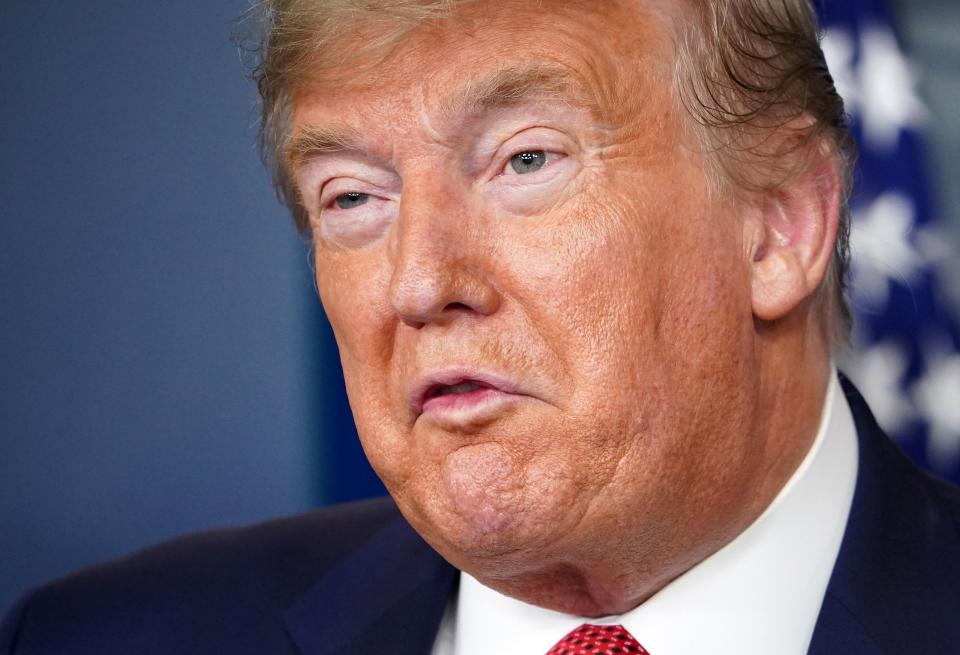Can Trump stop the oil war? It would mean a ‘180’ on his distaste for OPEC

U.S. President Donald Trump is in a tough spot if he intends to broker peace in the raging oil price war that has delivered a gut-punch to North American producers and compounded the impact of the COVID-19 virus.
Doing so would mean walking back his hatred of OPEC, and his long-held preference for cheap oil, according to one analyst. Trump’s intervention to support prices, if successful, would also have the dual effects of pushing gasoline prices higher as the U.S. economy sits on the brink of recession, while also winning political support in energy-dependent regions in an election year.
“It’s a really interesting challenge for him,” said Helima Croft, RBC Capital Markets’ managing director and global head of commodity strategy, on the bank’s podcast.
“He essentially has to do a 180 and appeal to the Saudis to play the regulator role, to work with the other sovereign producers to cut production to shore up U.S. oil producers. It’s not an easy balance.”
Trump has been a vocal critic of OPEC’s role in regulating output. He has lashed out in tweets predating his presidency, accusing the group of “ripping us off” and branding it a “monopoly.”
More recently, he has encouraged Saudi Arabia to keep the market well supplied, and touted low gasoline prices as a signature achievement of his presidency.
“It’s interesting to think about what leverage the U.S. has when the administration has spent three years being highly critical of [OPEC] playing the role of the central banker of oil,” Croft said.
On a recent trip to Western Pennsylvania, Trump celebrated the oil and gas boom in the region, calling the resources under his feet “our gold.”
Last week, Trump said he would intervene in the price war at “the appropriate time,” adding the downturn “hurts a great industry, and a very powerful industry.” He also noted that low gas prices are helpful to consumers.
Trump recently ordered U.S energy officials to purchase “large amounts” of oil to top up the nation’s emergency reserve and absorb some of the glut in crude markets. The plan, backed by oil industry lobbyists, was quashed on Thursday when the U.S. Department of Energy said it lacked funding from Congress.
North American benchmark West Texas Intermediate (WTI)(CL=F) fell about four per cent on Thursday morning after showing signs of strength on Wednesday. The price of WTI has declined about 60 per cent year-to-date, falling well below the break-even price for nearly all North American producers.
On Tuesday, G7 leaders appealed to oil producing countries to “support international efforts to promote global economic stability.”
The spat between Saudi Arabia and Russia started at the March 5 OPEC meeting in Vienna. Russia balked at a plan to restrain production to stabilize the global crude market in response to COVID-19. Saudi Arabia promptly responded by slashing its official selling prices for April deliveries to between US$6 and US$8 per barrel. With the previously agreed upon OPEC production cuts expiring at the end of March, Saudi Arabia and Russia can theoretically pump as much as they want.
Croft said while Saudi Arabia’s actions were likely designed to force Russia back the table, the June OPEC meeting is probably the earliest point at which the two sides could bury the hatchet. She said Russia is probably betting the Kingdom cannot sustain such low prices for long.
Jeff Lagerquist is a senior reporter at Yahoo Finance Canada. Follow him on Twitter @jefflagerquist.
Download the Yahoo Finance app, available for Apple and Android.

 Yahoo Finance
Yahoo Finance 
